Rice Mills are all you see as you drive on the Mwea-Embu Highway in Mwea Constituency, Kirinyaga County, especially in busy shopping centres.
But there is more than just rice farming here. As one leaves the highway behind, venturing deep into Nyamindi village, expansive farms welcome you, revealing a thriving agricultural community.
Sprawling maize, macadamia, coffee and tea farms are sandwiched between several rivers cascading into River Tana, the famous one being River Nyamindi. Tucked between the rivers are acres of farms owned by area Senator James Kamau Murango, an avid farmer. The youthful politician has an interest in macadamia, coffee, tea and mango farming, as well as livestock farming rearing. He keeps cows and goats.
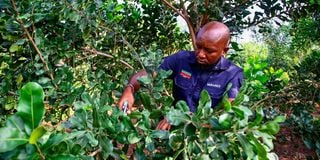
Kirinyaga Senator James Kamau Murango at one of his macadamia farms in South Ngariana, Mwea Constituency on December 26, 2023.
Photo credit: Wilfred Nyangaresi | Nation Media Group
“I was born in a family of farmers and I have grown up knowing that it is only through farming that one can get a decent livelihood,” says Mr Murango, adding that agriculture is the noblest way of earning a living.
The plant engineer says his father used proceeds from farming to educate his siblings after his grandfather joined Mau Mau, and after that raise his own family.
The senior Murango was born in 1946 and was nicknamed “murao”, meaning a tractor, because there was no place he could not plough.
“He is now approaching 80 years but is still farming. The first person I saw with grafted avocado was my father in the 1980’s,” says Murango.
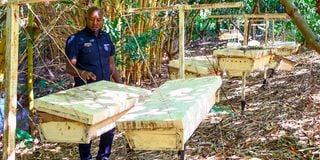
Senator James Murango inspects beehives at his farm in South Ngariana, Mwea Constituency, on December 26, 2023.
Photo credit: Wilfred Nyangaresi | Nation Media Group
As such, the former Kirinyaga County assembly majority leader is a champion of organic farming in the area. In his first farm measuring 20 acres, where he is growing mangoes, super Napier grass, dragon fruit, banana and indigenous lemon, he has employed a variety of farming methods aimed at producing natural food.
“I don’t use pesticides in my farms. I am a champion of organic farming. I also don’t use fertiliser but compost manure. Organic food fetches higher prices because people have realised the benefit of consuming safe and healthy food,” he says.
In his farms, he uses biochar, an organic fertiliser, made from ash from the bamboo tree.
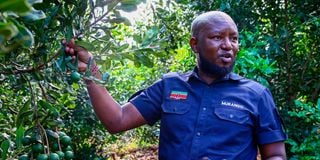
Kirinyaga Senator James Kamau Murango at one of his macadamia farms in South Ngariana, Mwea Constituency on December 26, 2023.
Photo credit: Wilfred Nyangaresi | Nation Media Group
“The biochar reduces soil emissions of greenhouse gases by absorbing carbon from the atmosphere and sinking it into the soil while also retaining useful microbes reducing the need for fertiliser requirements,” says the Senate Agriculture, Livestock and Fisheries Committee chairperson.
The farm also has several beehives. “I don’t rear the bees for honey but for pollination during flowering for more produce. I went to Colombia and found coffee farmers using wasps from Kenya to control aphids,” says Mr Murango. Another part of the farm has more than 1,200 macadamia trees. He explains that a mature macadamia tree can produce between 150 to 200 kilos in a lifetime.
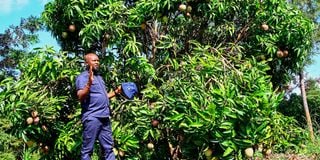
Kirinyaga Senator James Kamau Murango at his farm in South Ngariana, Mwea Constituency on December 26, 2023.
Photo credit: Wilfred Nyangaresi | Nation Media Group
“I have been growing macadamia for more than 10 years and have over 50 acres of the crop,” he says, adding that he has more than 300 goats for milk, each producing between three to five litres of milk daily. He also keeps goats for mutton. He also keeps a special breed of dairy cattle called Gir from Brazil, each producing more than 40 litres daily.
“I get at least Sh6 million monthly from farming alone. This is just from selling the produce from my farms,” he explains.
Mr Murango has been at the forefront of fighting for better prices for farmers.
Some of his bills include the Cotton Bill, Coffee Bill, Horticulture Bill, Livestock Extension Services Bill, Rice Bill, Agricultural Crops Development Bill and Agriculture and Food Authority (AFA) Act Cap 43 (Amendment Bill) currently being processed.
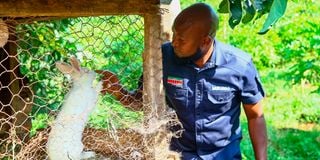
Senator James Murango is an avid farmer, who keeps a variety of animals at his expansive farms.
Photo credit: Wilfred Nyangaresi | Nation Media Group
Some of the challenges he says farmers face include low prices, lack of proper infrastructure to ease transportation of produce to the market and a lack of extension officers in the counties to train farmers on best agricultural practices.
“The biggest challenge facing farmers is low prices for their commodities.”
Source: nation.africa

Leave a Reply